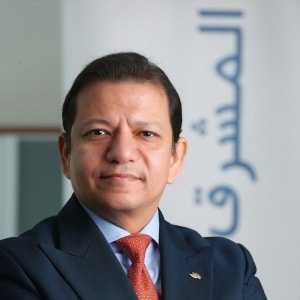Ahmed Abdelaal, group CEO of Mashreq Bank, discusses his new position and how Mashreq is handling the pandemic.

Global Finance: How is the bank adapting to the ongoing Covid- 19 crisis?
Ahmed Abdelaal: From ensuring the safety of our workforce and customers to the massive changes to cash flow and the disruption caused to the economy, we are navigating through some of the toughest times the world has ever faced. The outbreak of Covid-19 is causing a strain on all sectors, including the banking community. We continue to work with new developments every day to serve our customers and shareholders in the best way possible.
Our philosophy throughout this has been that the bigger the challenge, the more innovative we need to become. Thanks to our strategic focus on digital banking, we are able to offer our customers unparalleled services, 24 hours a day, from the safety of their homes. Back in March, we successfully transitioned our employees to perform their responsibilities remotely; and I am proud to say that 97% of our workforce were able to work from home during the critical time.
Furthermore, we have addressed the needs of those individuals and businesses whose livelihoods have been impacted due to the outbreak of Covid-19. Customers can approach the bank for a payment holiday on loans, cards and mortgages and receive increased flexibility and reduced costs in their payment terms, interest rates and processing fees.
One of the biggest takeaways from this crisis is the need for businesses to ensure that their operations are agile enough to move and change direction seamlessly in line with shifts in the environment and their changing customer preferences.
GF: You recently stepped in as CEO. What do you want to continue, and what new ideas do you wish to bring in?
Abdelaal: I’ve always seen Mashreq as one of the most successful banking organizations in the region and hold great respect for the man behind it—our chairman, His Excellency Abdul Aziz Al Ghurair. Today, we see immense growth opportunities in the digital area. In the coming years, we will continue to expand the bank’s digitization strategy in three key areas: branch transformation, digitizing customer journeys and build-out of the future technology platform.
We firmly believe that working with fintechs, rather than against them, can help us drive our own transformation. A noteworthy initiative was our recent strategic tripartite agreement with Dubai International Financial Centre and norbloc, to launch the region’s first production-ready blockchain KYC [know your customer] data-sharing consortium in 2020, which enables businesses and corporates to open digital bank accounts instantly. I am proud to state that the platform is now live and available to all UAE-based corporates and banks.
Mashreq also introduced the UAE’s first digital-only bank for SMEs [small and midsize enterprises], NEOBiz, which was launched following the success of its consumer-facing predecessor—Mashreq Neo. The response to this new proposition in terms of both scale and adoption has been very positive. So far, NEOBiz’s performance has exceeded our expectations.
GF: How does digital transformation impact the bank’s internal organization?
Abdelaal: We see a clear opportunity for all banks and businesses to embrace digital solutions to improve operational processes and efficiencies and reduce costs. In this context, Mashreq is well poised to serve banking customers going forward, mainly because innovation as well as digitization has been at the heart of our customer-centric strategy over several years. However, while we drive organizational change, we also believe that digital transformation must encourage a cultural shift. Therefore, our focus is also on upskilling our people to make them ready for digital banking.
In my opinion, banks have to operate more like technology companies. This means that transforming our operations to remain at the forefront of innovation will continue to be a key priority for Mashreq.
We have also introduced significant organizational change: Traditional segregation of functions and departments are being replaced with a multidisciplinary agile approach, with chapter leads focusing on controls, checks and balances. Control and risk management now employs more real-time tracking and intervention, as opposed to post facto review and audits. In fact, compliance, risk management and audit functions are increasingly contributing to the digital transformation along with technology and business.



